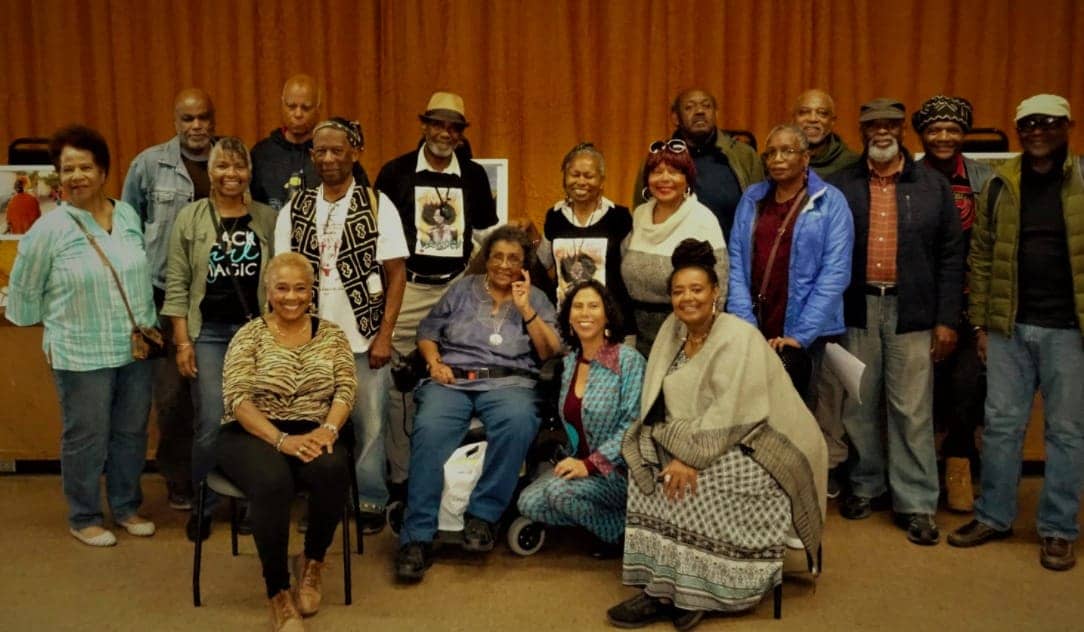
by Wanda Sabir, Arts and Culture Editor, wandaspicks.com
32nd Annual Celebration of African American Poets and Their Poetry, Feb. 19, 2022, 10 a.m.-12 p.m., virtual
I would like to invite you to the 32nd Annual Celebration of African American Poets and Their Poetry. We are dedicating this program to Al Young and bell hooks. This year, the theme is African American Health and Wellness. However, all themes are welcome.
We are featuring Baba Kalamu ya Salaam and perhaps you, if you let me know in advance you are coming and you are a poet of African American descent. We will have open mic sprinkled in with the featured artists.
Last year, we hosted our first virtual event, and it went really well. It was a great program honoring two poets who made their transitions late 2020 and early 2021: Adam David Miller (AD Miller) and QR Hand. This year, we will start and end earlier. We are looking once again for in-kind sponsors who can get the word out.
Please register in advance for Saturday, Feb. 19, 2022, 10 a.m.-12 p.m. PT here. We will have a virtual rehearsal-check-in, Thursday, Feb. 17, 2022, 12-1 p.m. PT. Please register in advance here. If you cannot make the rehearsal, Feb. 17, let me know. I will also open the room Feb. 19 at 9 a.m. PT.
Here is a link to the 31st Annual Celebration of African American Poets and Their Poetry and here is a link to the 30th Annual Celebration of African American Poets and Their Poetry blog entry.
We want to thank Nia McAllister at MoAD SF for her help with editing the video last year and posting it to the museum site. We also want to thank all of our in-kind sponsors for their help getting the word out and to the poets much love.
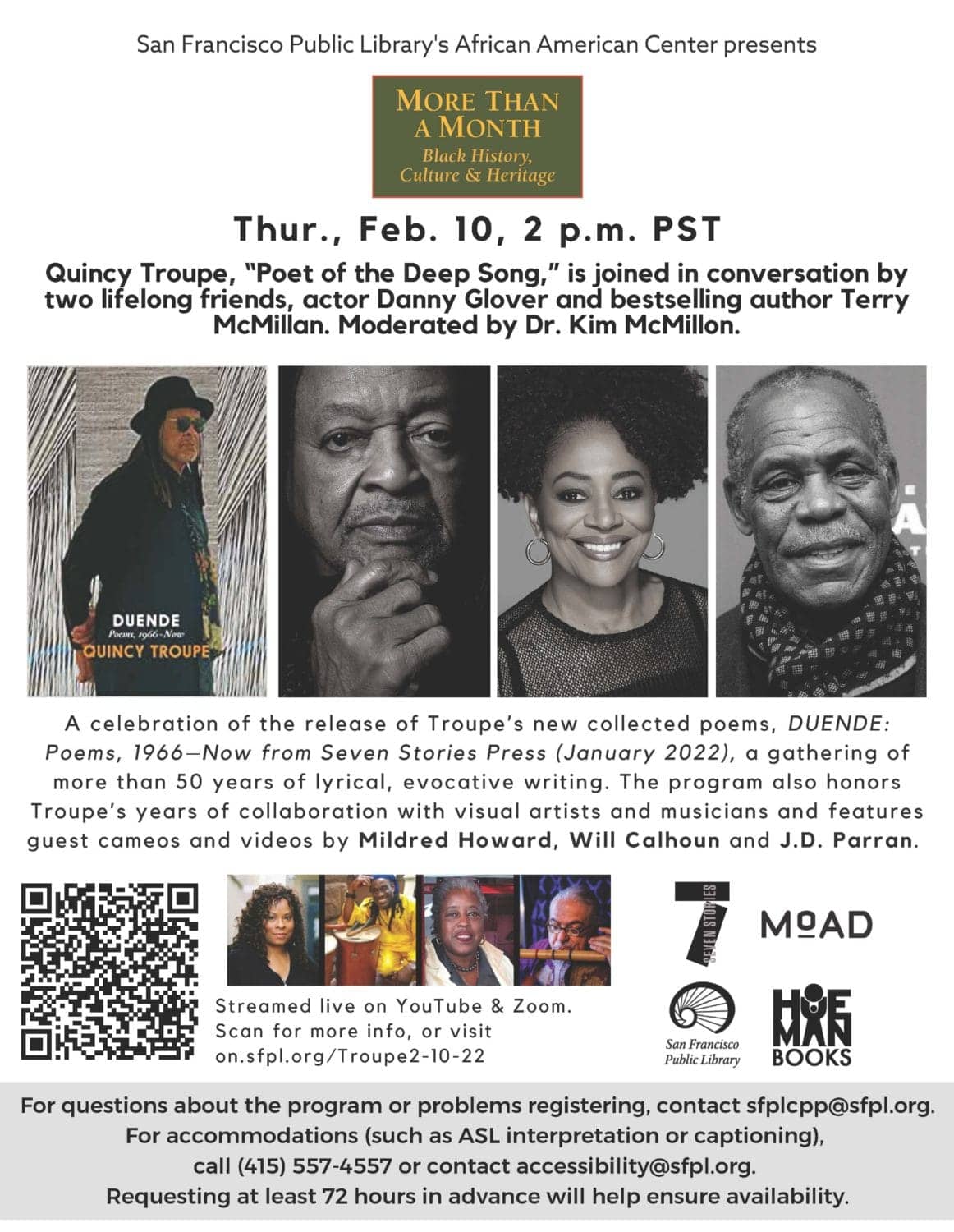
Beloved Thich Nhat Hanh, monk, Zen master and activist, dies at 95
“A monk with global influence and an ally of Martin Luther King Jr., he championed what he called ‘engaged Buddhism,’ applying its principles in pressing for peace.” – New York Times
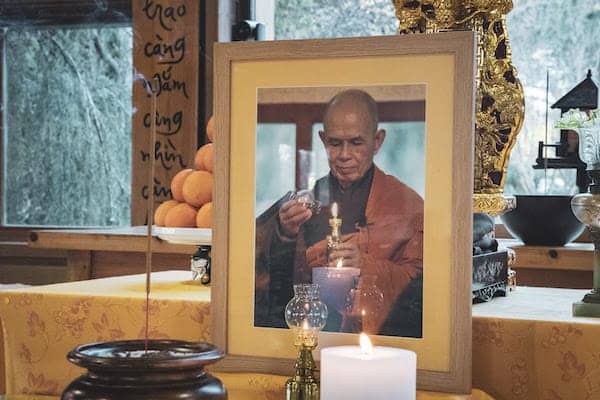
I hadn’t known of the commitment of Thich Nhat Hanh, monk, Zen master and activist, to continuing the work of Dr. King regarding “the Beloved Community” until today. I just always liked his energy and I also liked how accessible he was.
I remember his coming to Oakland, Calif., on several occasions. I never got to see him – sold out etc. – but I liked it that he was in the world and that one didn’t have to have lots of money or special status to be in the room with him. His memorial service began Jan. 25 and continued through the week virtually in real time. Plum Village, France, the master’s largest sangha, is hosting the services.
I remember my first encounter with “Thay’s” work. It was in his book “Peace in Every Step.” I think I was newly divorced and finding life really complicated; however, that book gave me strategies to take life one moment at a time and to be fully engaged so I could better appreciate what it meant to be alive.
The Beloved Community as a concept illustrated through Thich Nhat Hanh’s work guarantees presence forever.
A few years ago, I was listening to a KPFA fund drive and heard parts of the master’s “Happiness, Love and Liberation” lectures. I immediately resonated with his talks about the ancestors and how to channel this energy and how to be present with what is past, because what is past – passed – is not past. It is just energy. Transformed.
The last time I listened to the master was this last week. I am on the Plum Village listserve and run to open the missives. This one was a talk on what happens to the old year when the new year arrives. It was so funny and thought-provoking and then, the next day, Thay was gone. I was like, “Wow.”
The talks by teachers in this tradition are really helpful in understanding death and what happens after that. Many of our traditions speak of life everlasting. Certainly, this has to do with one’s work and the embodied actors to continue to carry the message in their actions. The Beloved Community as a concept illustrated through Thich Nhat Hanh’s work guarantees presence forever.
He will be missed. I do feel a bit of sorrow, but I know he was more than the vessel he called home, a home that was always bigger than the tangible container.
Elder Patrice Malidoma Somé, Jan. 30, 1956 – Dec. 9, 2021, Asé!
My introduction to Elder Malidoma Somé was through his book, a classic disapora story, “Of Water and Spirit.” When I read his story, I felt validated as an African American whose ancestors’ birthrights were stolen. That he was reunited with his family of origin and was able to survive initiation was almost magical; however, it just showed how his purpose was validated.
When the book was released, I remember going to a reading at Books Inc. in San Francisco. I don’t know if I greeted him, but the book was one I have never tired of as the enormous harm called MAAFA continues to unfold – George Floyd, Breonna Taylor and Ahmaud Arbery just recent examples of the role racism plays in dehumanizing certain people generations later. It is a part of the fabric of this nation and by extension Western culture.
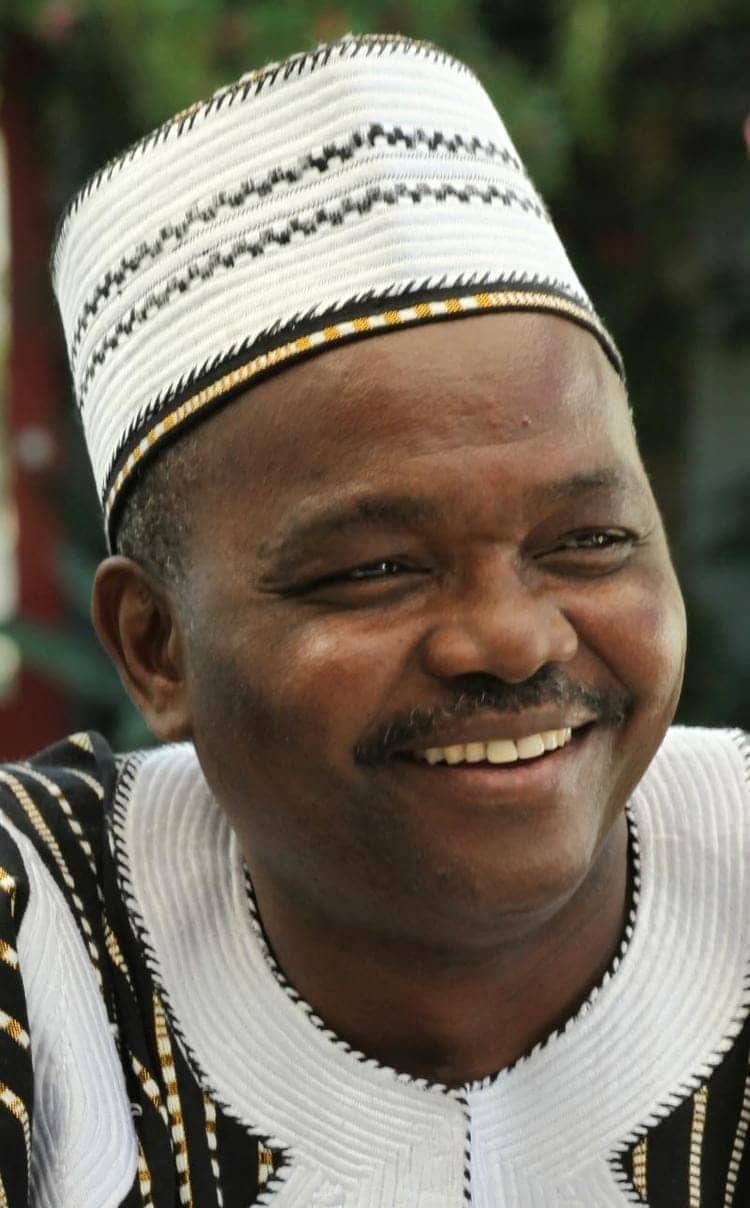
His books “Ritual: Power-Healing” and “The Healing Wisdom of Africa” are so wonderfully written and accessible. I always felt he was sent for “them” – as in, white men. He seemed to stand in the doorway with the sage, or efum, to cleanse whiteness or deactivate the charge.
Well educated in the Western psychological traditions, he always seemed a little beyond my reach; however, I knew he was a brother doing healing work for our people. Sister Afua knows his work well and would share his teachings at our MAAFA ceremonies, especially at Lake Merritt in June, the Libations for African Ancestors.
I am happy he has a body of work. I also miss his wife, Sobonfu Somé, who made her transition a while back, whom I did meet and was blessed to participate in an ancestral ceremony with. Asé to all those ancestors who served us well and may we continue to pass the wisdom forward as we wet our heads too.
From the newsletter: Elder Malidoma completed his most recent Initiation today, Thursday, Dec. 9, 2021. During the past 104 days, since returning from his homeland in Dano, Burkina Faso, Elder Malidoma moved forward as the Warrior that he is as he faced many unknown territories. I have been blessed to be by his side during this time, hold witness and offer support as he journeyed forward.
While negotiating the teachings and circumstances of this intense upgrade and initiatory process, he was adamant that he would continue to meet with his students in person for as long as he was able, and he did so.
In the midst of his traversing the multi-dimensions for healing, he also traveled to Colorado and to Asheville, N.C., for many programs between his appointments and rituals.
He seemed to stand in the doorway with the sage, or efum, to cleanse whiteness or deactivate the charge.
What an inspiration he will always be, living his medicine. During these past few months, he deployed an attack unlike any other – against the forces of adversity – and softened into what he has called his “new dispensation.” Elder Malidoma will soon be returning to Dano, Burkina Faso, where he will receive the traditional funeral rites of his tribe.
Here in the states two ritual weekend gatherings will be held in honor of Elder Malidoma in the springtime of 2022. Details about these services will be provided as they unfold. One service will be held in Asheville, N.C., at Ancestral Events in April and one service will be held in Cherry Plain, N.Y., at the East Coast Village in May.
For more information about these services, please contact info@malidoma.com. At this juncture, the family does not wish to be contacted directly, although emails are welcome at the office email address and will be shared with his family. Cards for the family can be mailed to Ancestral Events, 45 Wells Valley Dr., Leicester, N.C. 28748.
In lieu of flowers, the family is open to receiving monetary support to assist with the expenses to transport their Dad, Elder Malidoma to his Homeland – Mother Africa – where he will be honored as the Elder that he is – in his village.
Donations will also support his two daughters in paying the medical and other expenses that have been created during this time of their caring for their Dad. Donations can be made via PayPal using the “friends and family” category to info@malidoma.com from Elder Theresa Sykes Brittany.
‘Attica’: Film review and interview with director Stanley Nelson
Stanley Nelson, Emmy Award-winning director and co-founder of Firelight Media, says his recent film “Attica” is perhaps his most important film to date. With verdicts rolling in during its release in November 2021, acquittals reminiscent of the Trayvon Martin and Michael Brown murderers freed, one wonders how little has changed in 50 years.
The director and co-director share footage combed from correctional footage of the brutal carnage that day when talks ceased and bloodshed began. The parallels between correctional facilities personnel’s treatment of those held behind bars then and now are clear despite human rights laws passed, commissions assembled and substantive change not just at Attica State Prison but throughout the US post-Attica.
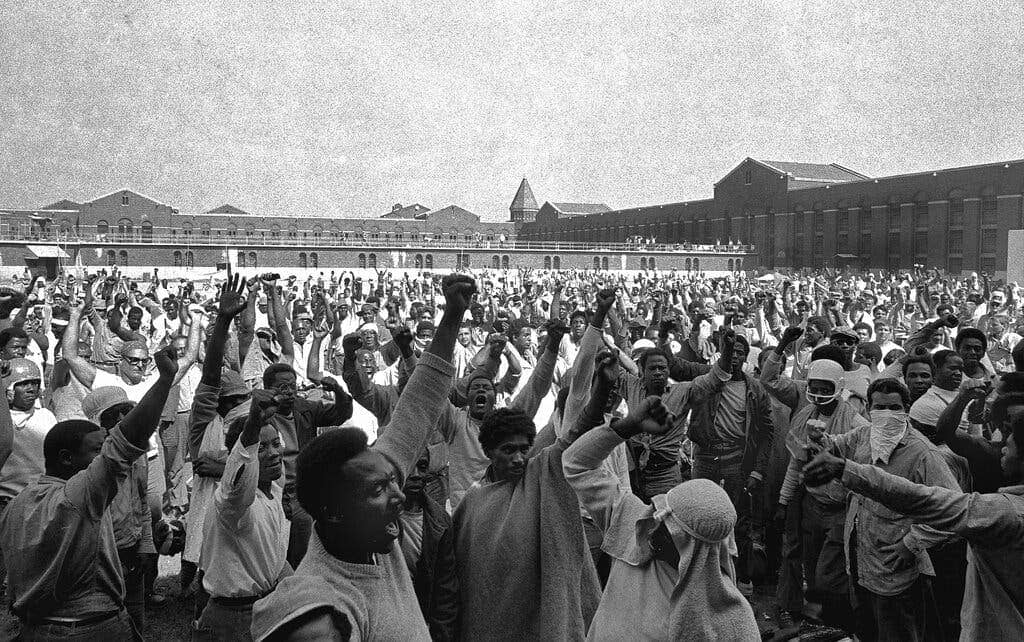
1971 was the year George Jackson was killed at San Quentin just a month before Attica exploded and the Vietnam War protests continued along with other protest movements. Bobby Seale, co-founder of the Black Panther Party, makes a brief cameo at the prison. He stops by for all of 10 minutes. The men are clearly disappointed.
However, their “manifesto” is strengthened by the example of such leaders we meet on the screen who take an important stand for justice: Herbert X Blyden, Frank Lott, Peter Butler, Donald “Don” Noble, Carl Jones-El, Frank “Big Black” Smith, Richard X Clark, Cleveland McKinley “Jomo” Davis and Elliott James “L.D.” Barkley.
Nonetheless, since Covid-19, the systemic disregard for human life continues during the pandemic – innocents held captive to an infectious disease they were bound to contract given the way safety from infection was handled. The disease was brought in and once in took over.
Similar attitudes clouded the minds of officials at Attica who, though forced to bargain with men whom they did not respect, the idea of honor, ethical behavior and human decency were not considerations the day talks were stopped and the air and ground attack began.
Nelson says he read Heather Ann Thompson’s Pulitzer prize-winning “Blood in the Water: The Attica Prison Uprising of 1971 and Its Legacy” (2016). Also a consultant on the film, one sees Thompson’s influence on the shape of Nelson’s “Attica,” the way the story unfolds and the directors’ compelling interviews with men who lived to finally have their say 50 years later. Perhaps the “revolution will be televised,” after all.
The director and I had a conversation on Wanda’s Picks Facebook when the film opened online via HBO and in select theaters early November 2021 on Showtime.
Since Covid-19, the systemic disregard for human life continues during the pandemic – innocents held captive to an infectious disease.
“Attica” moves between the archived documents and conversations between then President Nixon and New York presidential hopeful and Gov. Rockefeller, who was discouraged from meeting with the men, shows how the outcome was instigated and intentional.
“Are they Black (men)?” Nixon kept asking, as if the race of the men behind bars meant erasure would go uncensored. It wasn’t Gothic, rather antebellum curtains waving as family members of the guards held hostage grew more and more angry outside the facility.
Later, when the smoke cleared, the imprisoned men were accused of killing their hostages, who were all shot to death. Though disproved by the coroner, the myth prevails and the majority of white townsfolks still blame the victims in 2021, 50 years later, rather than their government officials who approved the unwarranted massacre. It is good that the directors were able to get the widow of one of the guards to share her family’s story.
It looked like a lynching mob outside Attica, especially when the correctional guards went in armed to the teeth, helicopters flew overhead and the shooting began. Hearing the testimony of men, the few who survived and are still alive today, was horrifying to witness.
The Attica experiment, like all social justice experiments between the 99 percent and the state, ended tragically; however, before the massacre, we see in the film comradery on the yard between men who found a point of agreement and so cooperated with one another.
There was order and the scenes where the men share stories about how it felt to be treated like a human being whose life mattered for the first time during the strike is a powerful statement this film makes. Those men did not leave the human race when they were locked behind bars.
The Attica Rebellion is a long overdue salute and reflection as is a book to their memory.
The strikers’ demands were seen as reasonable by the citizen review committee, which was there to help with negotiations. One of these persons, Clarence Jones, Amsterdam News publisher, is familiar to those of us who live here in the SF Bay Area. Dr. Jones was also Dr. King’s attorney. The celebrated author also taught a popular class at USF. He is about to be 90.
When Black journalist John Johnson, ABC, walks out of Attica that last evening, the assault underway, he has to repeat more than once who he is so he is not shot or ripped apart by the unruly Attica supporters.
Witnessing is so important when the truth runs counter to a dominate narrative to a question posed by Mumia Abu-Jamal, “Have Black Lives Ever Mattered?” (2017).
The film release following the International Tribunal on Human Rights Abuses Against Black, Brown and Indigenous Peoples: We Charge Genocide – another anniversary – is a reminder, Nelson says, that millions of Americans are behind bars, most of them BIPOC and increasingly women: mothers, sisters, aunts, great-grandmas.
The film moves like the drama it is, and even though, on its 50th anniversary, one would think the story all too familiar, Nelson says most of those people working on the film did not know the story prior to this project. Asé for all the lives lost.
The Attica Rebellion is a long overdue salute and reflection as is a book to their memory. Perhaps the film will encourage the public to read the book and discussions on the demands the men requested which have been rescinded throughout the state and federal corrections facilities.
Why are so many Americans locked behind bars? This is a stain against this democracy. Something is wrong. People live when we call their names and tell their stories.
The director and I had a conversation via Facebook Live when he was in town for opening night at SF Docs on Nov. 5. You can watch the interview here by going to Facebook.com/WandasPicks.
Bay View Arts and Culture Editor Wanda Sabir can be reached at wanda@wandaspicks.com. Visit her website at www.wandaspicks.com. Don’t miss a show! Follow Wanda at blogtalkradio.com/wandas-picks or download the podcast app here.

 Store
Store


